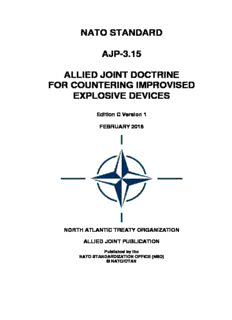
Allied joint doctrine for countering - improvised explosive devices PDF
Preview Allied joint doctrine for countering - improvised explosive devices
NATO STANDARD AJP-3.15 ALLIED JOINT DOCTRINE FOR COUNTERING IMPROVISED EXPLOSIVE DEVICES Edition C Version 1 FEBRUARY 2018 NORTH ATLANTIC TREATY ORGANIZATION ALLIED JOINT PUBLICATION Published by the NATO STANDARDIZATION OFFICE (NSO) © NATO/OTAN Intentionally blank NORTH ATLANTIC TREATY ORGANIZATION (NATO) NATO STANDARDIZATION OFFICE (NSO) NATO LETTER OF PROMULGATION 8 February 2018 1. The enclosed Allied Joint Publication AJP-3.15, Edition C, Version 1, ALLIED JOINT DOCTRINE FOR COUNTERING IMPROVISED EXPLOSIVE DEVICES, which has been approved by the nations in the Military Committee Joint Standardization Board, is promulgated herewith. The agreement of nations to use this publication is recorded in STANAG 2295. 2. AJP-3.15, Edition C, Version 1, is effective upon receipt and supersedes AJP-3.15, Edition B, Version 1, which shall be destroyed in accordance with the local procedure for the destruction of documents. 3. No part of this publication may be reproduced, stored in a retrieval system, used commercially, adapted, or transmitted in any form or by any means, electronic, mechanical, photo-copying, recording or otherwise, without the prior permission of the publisher. With the exception of commercial sales, this does not apply to member or partner nations, or NATO commands and bodies. 4. This publication shall be handled in accordance with C-M(2002)60. Edvardas MAŽEIKIS Major General, LTUAF Director, NATO Standardization Office Intentionally blank AJP-3.15 Allied Joint Publication-3.15 Allied Joint Doctrine for Countering Improvised Explosive Devices Edition C Version 1 Allied Joint Publication-3.3 (AJP-3.3), dated February 2018, is promulgated as directed by the Chiefs of Staff Director Concepts and Doctrine i Edition C Version 1 AJP-3.15 Adopting NATO doctrine NATO underpins the defence of the UK and our allies, while also providing deployable, expeditionary capabilities to support and defend our interests further afield. In addition, the European Security and Defence Policy specifies that European Union-led military operations should also use NATO doctrine. The Development, Concepts and Doctrine Centre (DCDC) plays a leading role in producing NATO doctrine; the UK holds custodianship for several NATO Allied Joint Publications (AJPs) and participates actively in producing all others. The need to achieve maximum coherence and interoperability within, and between, our closest allies and partners is vital. NATO is the institution best placed to help us achieve this. In July 2012, the Chief of the Defence Staff and the Permanent Under Secretary issued clear direction on how the UK’s contribution to NATO could be further improved, stating that: ‘We should use NATO doctrine wherever we can, and ensure coherence of UK doctrine with NATO wherever we cannot.’ In response, DCDC revised the UK doctrine architecture. Our doctrine now comprises: • NATO AJPs (may have directly replaced a JDP equivalent); • NATO AJPs with UK caveats or supplements as necessary in the form of ‘green pages’; • national doctrine (JDPs). Where an AJP is adopted in lieu of a UK JDP the latter document will be withdrawn from extant UK doctrine architecture. Where necessary, the publication will also include UK text, diagrams, vignettes and photographs, all with a green background or border to distinguish the content. Such a hybrid document has a split cover with both NATO and DCDC livery. These additions will be made when appropriate to explain a particular UK approach to operations, to aid understanding or to increase appeal/interest. No NATO text (against a white background) will be altered or removed. UK green pages take precedence over NATO doctrine where competing terms and concepts differ. This move re-enforces the UK’s commitment to NATO and gives our Armed Forces greater interoperability within the coalition than before. ii Edition C Version 1 AJP-3.15 RECORD OF RESERVATIONS CHAPTER RECORD OF RESERVATION BY NATIONS Note: The reservations listed on this page include only those that were recorded at time of promulgation and may not be complete. Refer to the NATO Standardization Document Database for the complete list of existing reservations. iii Edition C Version 1 AJP-3.15 Intentionally blank iv Edition C Version 1 AJP-3.15 RECORD OF SPECIFIC RESERVATIONS [nation] [detail of reservation] FRA The French Army cannot staff a C IED CJTF as described in the document, but in-theatre organic elements placed under the Military Engineering command and control. The joint force engineer (JFENGR) to the force commander is then the sole authority for coordination and technical expertise. USA The US has reservations with numerous terms (definitions and acronyms) throughout the AJP that do not conform to the guidance found in C-M (2007) 0023. Continued use of these terms introduces confusion with other components and with USA terminology during US led operations. This reservation will be withdrawn once approved terms are used throughout the AJP; or once revised terms are formally agreed by NATO and reflected in the NATO Term database. The US view of human rights law is that it does not apply extraterritorial. We understand for members of the European Convention on Human Rights, there may be extraterritorial effect, however that convention is not applicable to the United States. The US does not agree with the descriptions of effects given throughout the AJP. Effects are created or generated to support achievement of objectives. Unless changed IAW our comments, applicable portions of this AJP will be ignored. Note: The reservations listed on this page include only those that were recorded at time of promulgation and may not be complete. Refer to the NATO Standardization Document Database for the complete list of existing reservations. v Edition C Version 1 AJP-3.15 Intentionally blank vi Edition C Version 1
Description: